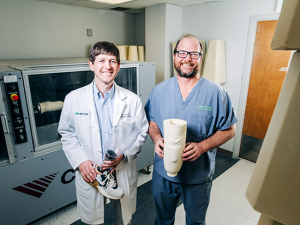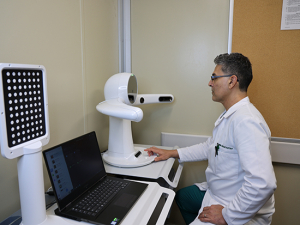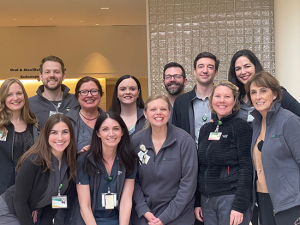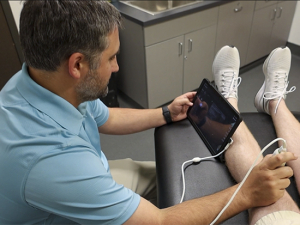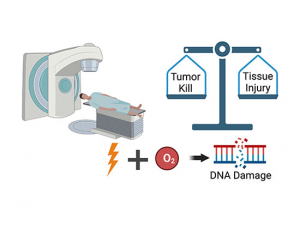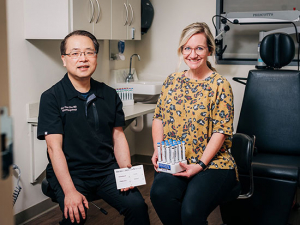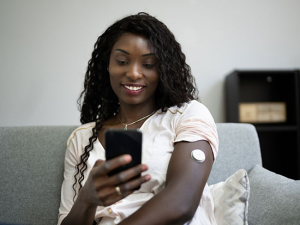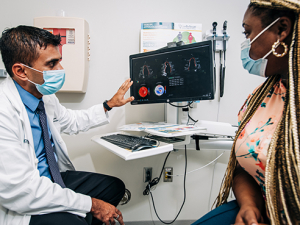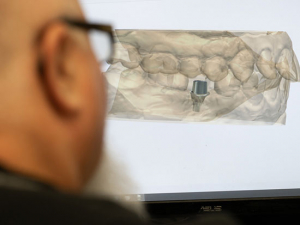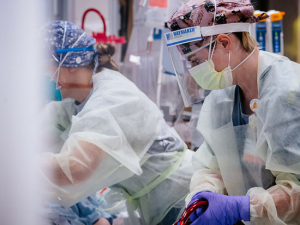 Aaron Fobian, Ph.D., associate professor in the UAB Department of Psychiatry and Behavioral Neurobiology, is chief scientific officer and founder of ReACT FND Health, which she founded to make Retraining and Control Therapy available to patients worldwide.When people describe your company’s product as “amazing,” allowing them to “take back control of their life” or say it is “giving our daughter her life back”; when they fly in from points around the country for treatment; and when health care practitioners in countries around the planet are on a waiting list to learn how to use it, you are probably on to something.
Aaron Fobian, Ph.D., associate professor in the UAB Department of Psychiatry and Behavioral Neurobiology, is chief scientific officer and founder of ReACT FND Health, which she founded to make Retraining and Control Therapy available to patients worldwide.When people describe your company’s product as “amazing,” allowing them to “take back control of their life” or say it is “giving our daughter her life back”; when they fly in from points around the country for treatment; and when health care practitioners in countries around the planet are on a waiting list to learn how to use it, you are probably on to something.
This describes Retraining and Control Therapy, or ReACT, the reason for being of UAB’s latest startup, ReACT FND Health. The company’s chief scientific officer and founder is clinical psychologist Aaron Fobian, Ph.D., associate professor in the Department of Psychiatry and Behavioral Neurobiology in the UAB Heersink School of Medicine. Fobian developed ReACT to help patients with functional neurological disorder, or FND, which affects an estimated 300,000 Americans.
In 2018, Fobian helped to begin an interdisciplinary treatment program at UAB to treat patients with FND; in 2020, she published the positive results of a 29-participant trial of ReACT that was the first randomized controlled trial of any treatment for pediatric functional seizures.
Symptoms of functional neurological disorder include seizure-like episodes, movement problems, dizziness, cognitive function difficulties, speech difficulties and other neurological symptoms.
Demand has been overwhelming
Over the past 12 months, UAB’s Interdisciplinary Functional Neurological Disorder Treatment Program has treated 210 patients. And while Fobian continues to study ReACT through major NIH grants and ongoing clinical trials, the demand from patients and practitioners to access the treatment has been overwhelming. Thus, Fobian and clinical psychologist Areti Vassilopoulos, Ph.D., ReACT FND Health’s chief operating officer, are working to address that need.
“Our overall mission for ReACT FND Health is to be able to expand research-supported FND treatment to every individual in the United States with FND,” Fobian said. “Research-informed FND treatment is very difficult to find anywhere, and the symptoms themselves are incredibly debilitating to patients and their families. The symptoms keep children from being able to attend school and do things with their friends and keep adults from being able to go to work. It has a significant psychosocial and financial impact.”
An FND diagnosis costs families $87,000 per year to manage and the health care system $1.2 billion every year, Fobian said. “About 70 percent of adults with FND have to quit work, and the majority of our pediatric patients are not in school. Our goal is to provide patients with treatment, so they are able to get back to their daily lives.”
Launched this month
ReACT FND Health, which launched in July through UAB’s Harbert Institute for Innovation and Entrepreneurship, will soon make treatment available through telemedicine for patients outside Alabama. By early 2025, it will begin training and certifying providers, drawing from a waiting list that includes practitioners across the country as well as in Canada, Mexico, Brazil, the United Kingdom, Iceland, Australia and New Zealand.
"FND is the second most common diagnosis in neurology clinics and is especially prevalent in teenage girls. Currently, there is no other proven therapy that effectively treats FND," said Kathy Nugent, Ph.D., Executive Director of the Harbert Institute. "We're extremely supportive of ReACT's mission, and proud that Dr. Fobian's research at UAB provided the basis for this start-up."
Most behavioral health therapies are “manualized,” with a strict flow that practitioners must follow, Fobian explains. But ReACT, like functional neurological disorder, adapts from patient to patient and even from session to session if patients develop new symptoms, she says. In training the UAB clinical psychology doctoral students who help her see patients in the FND Treatment Program, Fobian has built out a complex adaptive digital treatment manual, called the ReACT Precision Treatment Tool. She contracted with a local design firm to create the Precision Treatment Tool at https://ReACTfnd.health.
“In general, the health care system does a really poor job of disseminating evidence-based mental health treatments,” Fobian said. “As they are disseminated, the fidelity of the intervention being provided decreases. A lot of times it gets to the point where the patient may not be getting the treatment as it was originally designed. Our goal with ReACT FND Health is to disseminate this treatment with fidelity; to help therapists make decisions for this complex condition in-session so they can tailor the intervention to the precise symptoms that the patient has been having.”
The first therapist-centered digital platform tailored to each patient's needs
In fact, the digital manual for ReACT, called the Precision Treatment Tool, is the first therapist-centered digital platform that is standardized and tailored to each individual patient’s needs at each individual session, Fobian says.
Another goal for the company is to reduce the time between diagnosis and treatment for patients, Fobian added. “We just published research showing that it is, on average, six months between when symptoms begin to when they start treatment and nearly one year between symptom onset and treatment onset for our pediatric patients. This can be even longer in adults. Our goal is to reduce those timeframes, so we can prevent the psychosocial outcomes of being out of school or work for that long.”
